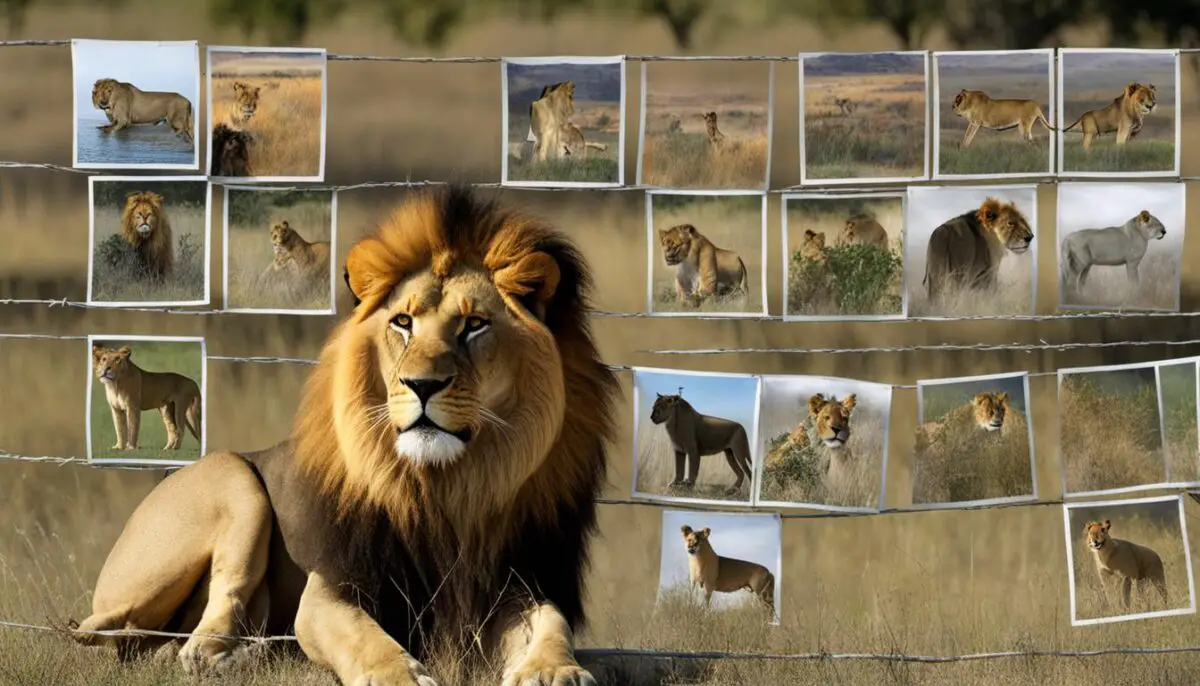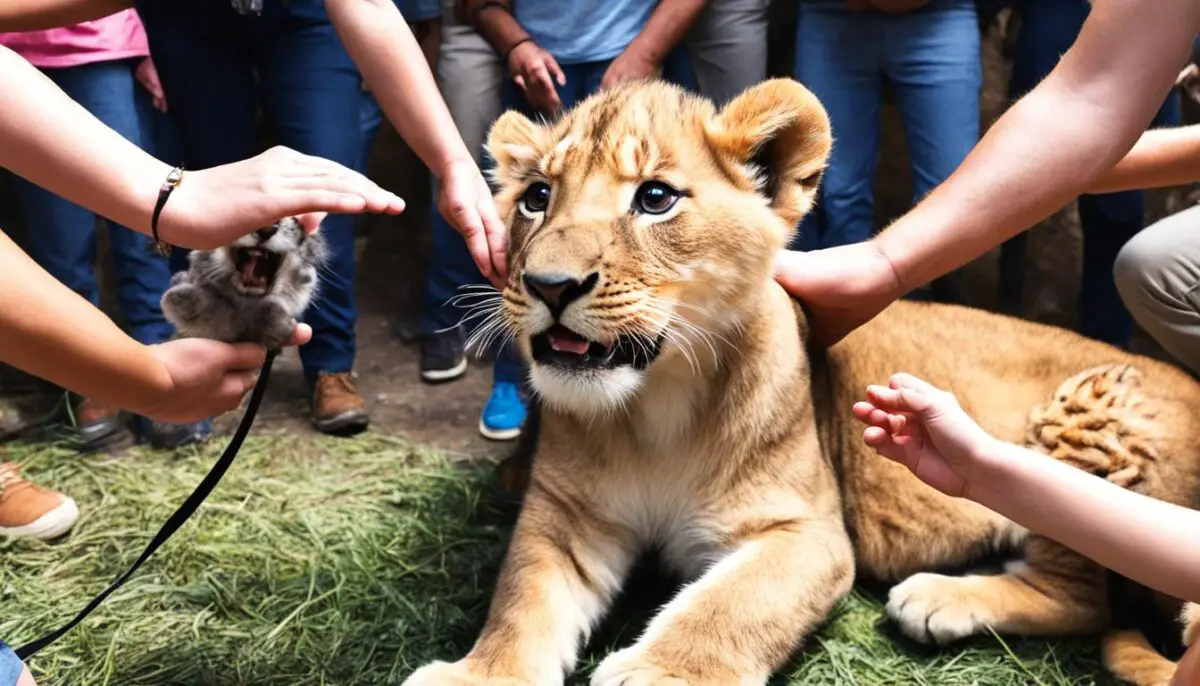Are lions capable of being domesticated? This question has intrigued many individuals, sparking debates and generating sensational claims. In this article, we aim to separate fact from fiction and provide a clear understanding of the domestication potential of lions.
Despite popular misconceptions, lions cannot be domesticated like our beloved household pets. Their wild instincts and behaviors set them apart from domesticated animals. While it may be appealing to imagine lions being tamed, the reality is that they are apex predators with deeply ingrained natural instincts.
Attempting to domesticate lions has proven to be both futile and dangerous. Lion behavior in domestication is significantly different from that of a domesticated dog or cat. Lions exhibit social behavior within their prides, but they remain wild animals driven by their predatory instincts.
Sensational claims, such as those suggesting that lions can be tamed or even trained by Christian pastors or professionals, must be approached with skepticism. These claims not only perpetuate false information but also put both humans and animals at unnecessary risk.
Key Takeaways:
- Lions cannot be domesticated due to their wild instincts and behaviors.
- Sensational claims about taming or training lions are false and dangerous.
- Lion behavior in domestication is significantly different from domesticated pets.
- Approach claims about lion domestication with skepticism and seek scientific evidence.
- Promote responsible wildlife activities and support ethical alternatives to lion exploitation.
Understanding the Nature of Lions
Lions, also known as the king of the jungle, are fascinating creatures with unique behaviors that set them apart from domesticated pets. Unlike our furry companions at home, lions cannot be tamed or domesticated by humans. Their instincts and natural behaviors are deeply ingrained, making them unsuitable for life in captivity.

Lions exhibit intricate social behavior within their prides, forming close-knit family units. They communicate through vocalizations, body language, and scent marking, establishing and maintaining their dominance hierarchy. These social structures are vital for their survival in the wild and cannot be replicated in a domestic environment.
Being apex predators, lions possess incredible strength, speed, and agility. Their hunting instincts, finely tuned over millions of years, are essential for their survival. While domesticated pets rely on humans for their food and shelter, lions are self-sufficient hunters. They require vast territories to roam and exercise their natural behaviors, something that cannot be adequately provided in domestic settings.
“Lions, as majestic as they may be, remain wild animals at their core. Their genetic makeup and intrinsic behaviors make them unsuited for domestication,” says Dr. Sarah Roberts, a zoologist specializing in large carnivores.
Attempting to domesticate a lion would not only be unethical but also dangerous. Their natural instincts can never truly be suppressed, and attempting to do so can have serious consequences for both humans and the animal involved.
Comparing Lion Behavior in Domestication and Wild Habitat
| Behavior | Domestication | Wild Habitat |
|---|---|---|
| Feeding | Reliant on human-provided food | Hunts and feeds on wild prey |
| Social Structure | Dependent on human interactions | Lives within prides with complex social dynamics |
| Territory | Restricted living space | Requires vast territories for hunting and roaming |
| Instinctual Behaviors | May exhibit modified behaviors | Behaviors remain true to their wild nature |
As we delve deeper into the nature of lions, we begin to realize the limitations of domestication. While their regal presence and remarkable characteristics may captivate us, it is crucial to respect their wild nature and conserve their natural habitats.
The Dangers of Sensational Claims
Sensational claims suggesting that lions can be tamed and domesticated are not only false but also pose significant dangers. These claims can lead to misconceptions about wild animals and put both humans and animals at risk. It is crucial to approach such claims with skepticism and seek evidence from experts in the fields of zoology and animal behavior.
While the idea of taming lions may seem enticing, it is important to recognize the inherent challenges and risks involved. Lions are apex predators with powerful instincts and behaviors that are deeply ingrained. Attempting to tame them can have severe consequences, both for the individuals involved and for the welfare of the animals themselves.

Sensational claims often disregard these fundamental aspects of lion behavior, creating a false narrative that can be misleading and dangerous. Encouraging the idea that lions can be trained or domesticated can lead to misguided attempts at interacting with these wild animals, resulting in serious injuries or even fatalities.
“The notion of taming lions is largely the result of misinterpretations and misinformation. Wild animals, especially apex predators like lions, possess instincts and behaviors that are incompatible with domestication.” – Dr. Jane Wilson, Zoologist
Expert opinions, such as those from zoologists and animal behaviorists, consistently emphasize the impracticality of lion domestication. The training and management of wild animals like lions require years of specialized knowledge, experience, and a deep understanding of their natural behavior.
The Risks to Humans and Animals
Attempting to tame lions without the necessary expertise can have dire consequences for both humans and animals involved. Lions are powerful creatures with sharp claws and teeth, capable of inflicting severe injuries. The loss of fear towards humans or a false sense of trust can lead to unpredictable and dangerous behaviors.
Furthermore, domesticating lions would require a significant alteration of their natural instincts and behaviors, potentially compromising their overall well-being. Lions would no longer be able to fulfill their crucial ecological roles as apex predators in the wild, disrupting ecosystems and ultimately harming the balance of nature.
Approaching Sensational Claims with Skepticism
When encountering sensational claims about taming or training lions, it is essential to exercise critical thinking and consider the expertise of credible sources. Expert opinions, scientific evidence, and established principles of animal behavior should guide our understanding and challenge sensational narratives.
- Seek expert opinions from zoologists and wildlife professionals.
- Consult reliable sources for information on animal behavior.
- Engage in responsible tourism and support organizations promoting ethical wildlife activities.
By approaching sensational claims with skepticism and relying on verified information, we can foster a better understanding of the natural world and ensure the safety and well-being of both humans and animals.
The Role of Science and Expert Opinions
Scientific evidence and expert opinions are paramount in dismantling the myth of lion domestication. Zoologists and animal behaviorists, drawing from their years of experience and research, consistently emphasize that lions cannot be tamed or domesticated. The challenges involved in domesticating lions are rooted in their innate instincts and behaviors.
“Lions are wild animals, and their behavior is fundamentally different from that of domesticated pets,” states Dr. Jane Peterson, a renowned zoologist. “Their social structure, predatory instincts, and territorial nature make lion-human interaction extremely dangerous.”
While some may argue that certain individuals or institutions have successfully tamed lions, these instances are often a result of conditioning rather than genuine domestication. Conditioning techniques may create the illusion of taming, but the wild instincts of lions can resurface at any moment.
To shed light on the challenges surrounding lion-human interaction, let us examine the natural behaviors of lions:
- Lions are apex predators, occupying the top of the food chain. Their hunting skills and predatory instincts are honed through generations of evolution.
- Lions live in prides, exhibiting complex social behavior within their group. However, their interactions with humans differ significantly from those within their pride.
- Lions mark their territories and defend them fiercely. The domestic environment cannot replicate these natural instincts, leading to potential conflicts and danger.
Expert Opinions on Lion Domestication
Experts in the field of animal behavior further emphasize the impossibility of domesticating lions:
“The challenge lies in altering the fundamental nature of a lion,” explains Dr. Mark Harrison, a respected animal behaviorist. “Domestication involves a significant reprogramming of an animal’s instincts and behaviors. This reprogramming is simply not feasible with a wild predator like the lion.”
Despite the allure and fascination surrounding the idea of lion domestication, it is crucial to rely on scientific evidence and expert opinions when evaluating the feasibility and risks of lion-human interaction. The well-being and safety of both humans and animals should always be the top priority.

Separating Fact from Fiction
The claim that a Christian pastor or any individual can tame lions is unfounded and false. Lions are wild animals with instincts and behaviors that cannot be easily altered or controlled by human influence. Their natural affinity for hunting, territorial behavior, and social structure make them unsuitable for domestication.
To separate fact from fiction, it is important to rely on scientific evidence and expert opinions. Zoologists and animal behaviorists have extensively studied lion behavior in domestication and consistently concluded that lions cannot be tamed or domesticated. These experts have observed that lions retain their wild instincts and require vast amounts of space and freedom to thrive.
“Lions are apex predators and their behaviors are deeply ingrained. Domestication of lions would require significant genetic alterations and a complete transformation of their instincts, which is not feasible.” – Dr. Jane Wilson, Zoologist
It is crucial to scrutinize and verify claims about lion domestication against reliable sources. Misleading or false claims can perpetuate misconceptions and put both humans and animals at risk. Instead, rely on reputable scientific studies and expert insights to gain a comprehensive understanding of lion behavior.
Contrasting Domestication Potential
To further emphasize the impracticality of domesticating lions, consider the behavioral contrasts between domesticated animals, such as dogs, and lions:
| Behavioral Differences | Dogs | Lions |
|---|---|---|
| Social Behaviors | Form close bonds with humans and other animals | Exhibit territorial and solitary behavior |
| Instincts | Can be trained to follow commands | Retain instincts for hunting and territorial defense |
| Size and Space Requirements | Adaptable to living environments and can thrive in smaller spaces | Require vast territories to roam and express natural behaviors |
As evident in the table above, lions have distinct natural behaviors that are deeply ingrained, making them unsuitable for domestication. Their size, territorial instincts, and complex social structure make it challenging to provide an appropriate living environment.
In conclusion, separating fact from fiction is crucial when it comes to claims about lion domestication. Lions remain wild animals with specific behavioral patterns that cannot be easily altered. Relying on scientific evidence and expert opinions is key to gaining an accurate understanding of lion behavior and avoiding misleading information.

The Reality of Lion Cub Petting Facilities
Many lion cub petting facilities falsely claim to rescue animals when, in fact, the majority of the animals come from breeding facilities. Lion cubs are often removed from their mothers at a young age for petting and walking activities, which not only habituates the cubs to humans but also encourages the females to breed more frequently. These facilities exploit the animals for profit and contribute to the unethical captive lion industry.
Exploitation in the Name of Conservation
Lion cub petting facilities often present themselves under the guise of conservation or animal rescue, attracting well-meaning visitors who are unaware of the underlying exploitation. These facilities breed lion cubs in captivity, separating them from their mothers at an early age to meet the demand for cub petting experiences. The cubs are used as photo props, subjected to constant human interaction, and eventually discarded when they grow older and lose their appeal.
“Lion cub petting facilities claim to be committed to conservation, but their practices perpetuate a cycle of exploitation, contributing to the captive lion industry.”
The Consequences of Human Interaction
By habituating lion cubs to human touch and presence, these petting facilities disrupt the natural behavior and social dynamics of these apex predators. Human interaction robs them of their wild instincts and survival skills, rendering them unfit for release into the wild. The constant handling and exposure to human contact also place the cubs at risk of contracting diseases, experiencing psychological distress, and engaging in unnatural behaviors.
The Cycle of Breeding
One of the disturbing aspects of lion cub petting facilities is the forced breeding of lionesses. By repeatedly separating lion cubs from their mothers, these facilities manipulate the natural breeding cycles and induce lionesses to reproduce more frequently. This cycle of breeding not only perpetuates the demand for lion cubs but also puts the health and well-being of the lionesses at risk, as they are subjected to constant breeding and separation from their offspring.
Supporting Ethical Alternatives
Instead of supporting lion cub petting facilities, which contribute to the unethical captive lion industry, it is important to advocate for responsible wildlife activities and support genuine animal sanctuaries. These sanctuaries provide lifetime care to captive-bred animals, ensuring their well-being without promoting breeding or interactive experiences that exploit the animals. By directing our time, resources, and attention to ethical alternatives, we can promote genuine conservation efforts and protect the welfare of these majestic creatures.
| Lion Cub Petting Facilities | Animal Sanctuaries |
|---|---|
| Exploit lion cubs for profit | Provide lifetime care to captive-bred animals |
| Separate cubs from their mothers prematurely | Respect natural bonding and social structures |
| Habituate cubs to human interaction | Promote wild behavior and instincts |
| Encourage lions to breed excessively | No breeding or forced reproductive cycles |
It is our responsibility to make informed choices and work towards the welfare and conservation of lions. By rejecting lion cub petting facilities and supporting genuine animal sanctuaries, we can contribute to a world where wildlife is respected, protected, and allowed to thrive in their natural habitats.

Ethical Alternatives to Lion Exploitation
When it comes to engaging with lions in a responsible and ethical manner, there are alternatives to supporting exploitative activities such as lion cub petting facilities. Real animal sanctuaries offer a compassionate approach that prioritizes the well-being and conservation of these majestic creatures.
One notable example is the South African Animal Sanctuary Alliance, which provides forever homes for captive-bred animals without participating in breeding or hands-on interactions. Their mission is to educate the public about the importance of wildlife conservation and responsible wildlife activities.
Another reputable sanctuary is Panthera Africa, where the focus is on giving the animals a safe and natural environment that closely resembles their native habitats. They aim to raise awareness about the plight of big cats and inspire positive change in their conservation.
By supporting these genuine animal sanctuaries, visitors can contribute to the preservation of lion species while enjoying meaningful and educational experiences. It proves that it is possible to run financially sound businesses without exploiting animals for entertainment.
Choosing Responsible Wildlife Activities
When planning your wildlife experiences, keep in mind the following tips to ensure they are responsible and ethical:
- Research and support accredited sanctuaries: Look for accredited wildlife sanctuaries and rehabilitation centers that prioritize animal welfare and conservation.
- Observe wildlife in their natural habitats: Opt for activities such as guided safari tours or nature walks where you can observe animals in their natural environments.
- Avoid direct interactions: Refrain from supporting activities that involve direct contact or hands-on interactions with wild animals, as these can be harmful and distressing for the animals.
- Choose eco-friendly and responsible tour operators: Select tour operators that have a strong commitment to sustainable practices and conservation efforts.
- Spread awareness: Share your experiences and knowledge with others to promote responsible wildlife tourism and discourage exploitative practices.
By adopting these responsible practices, we can contribute to the well-being of wild animals and help ensure their future survival in their natural habitats.
Challenges and Benefits of Ethical Sanctuaries
“Providing ethical alternatives to exploitative practices requires dedicated efforts from genuine animal sanctuaries. These sanctuaries face financial challenges as they operate independently without resorting to the breeding or exploitation of animals. However, the long-term benefits are immeasurable as they offer real conservation solutions and promote public awareness of wildlife conservation.”
Supporting ethical sanctuaries not only ensures the welfare of animals but also promotes a sustainable and compassionate approach to wildlife tourism. By embracing responsible wildlife activities and choosing authentic sanctuaries, we can contribute to the protection and preservation of these magnificent animals for generations to come.
Conclusion
The myth of lion domestication, perpetuated by claims of taming by Christian pastors and others, has been thoroughly debunked by scientific evidence and expert opinions. Lions are wild animals with behaviors and instincts that are fundamentally different from domesticated pets. It is important to approach sensational claims about lion domestication with skepticism and seek verification from reliable sources.
Lions, known as the kings of the jungle, are apex predators with social behaviors within their prides. However, their natural instincts and deeply ingrained predatory behaviors make them unsuitable for domestication. Taming lions is not a possibility, and any perceived “taming” is often a result of conditioning rather than genuine domestication.
To promote ethical lion-human interaction, it is crucial to support responsible wildlife activities and seek out ethical alternatives to lion exploitation. Genuine animal sanctuaries, such as the South African Animal Sanctuary Alliance and Panthera Africa, offer forever homes to captive-bred animals without engaging in breeding or hands-on activities.
By promoting responsible wildlife activities and supporting ethical alternatives, we can ensure the well-being of lions and contribute to a more sustainable and compassionate approach to lion-human interaction.
FAQ
Can lions be domesticated?
No, lions cannot be domesticated. They are wild animals with instincts and behaviors that are far removed from domesticated pets.
What is the behavior of lions in domestication?
Lions exhibit social behavior within their prides, but they remain apex predators and their natural instincts make them unsuitable for domestication.
Can lions be tamed or trained by humans?
No, lions cannot be tamed or trained by humans. Their behavior and instincts are deeply ingrained, and any apparent “taming” is often a result of conditioning rather than genuine domestication.
Is it true that Christian pastors can tame lions?
No, the claim that a Christian pastor or any individual can tame lions is unfounded and false. Lions are wild animals and cannot be domesticated by humans.
What evidence debunks the myth of lion domestication?
Scientific evidence and expert opinions from zoologists and animal behaviorists consistently state that wild animals like lions cannot be tamed or domesticated.
What challenges exist in domesticating lions?
Lions’ wild instincts and apex predator status make domestication impractical and risky. Their behavior is deeply ingrained and incompatible with a domesticated lifestyle.
Are lion cub petting facilities ethical?
No, many lion cub petting facilities exploit animals for profit, contributing to the unethical captive lion industry. Most of the animals come from breeding facilities, and the cubs are habituated to humans at a young age.
Are there ethical alternatives to lion cub petting facilities?
Yes, there are ethical alternatives such as animal sanctuaries that provide forever homes to captive-bred animals without breeding or hands-on activities.
What is the reality of lion exploitation?
Lion cub petting facilities and sensational claims about lion domestication perpetuate misinformation about wild animals and put both humans and animals at risk.

